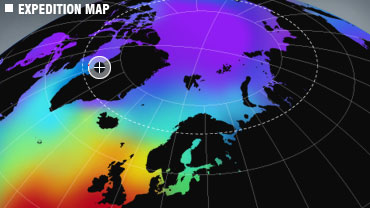Why Disko Bay?
Background
Since 2003 Cape Farewell has led six expeditions to the Arctic, taking artists, scientists, educators and communicators to experience the effects of climate change first-hand. By physically sailing to the heart of the debate, Cape Farewell aims to draw people’s attention to the effects of ocean currents on us and our climate – revealing the workings of this crucial part of the planet through scientific experiments, film, live web broadcasts, events, exhibitions and the insight of artists and educators. From these expeditions has sprung an incredible body of artworks, exhibitions, publications and educational resources. Each journey is a catalyst for all our subsequent activity.
About Cape Farewell ›
Why Greenland?
“Climate scientists predict that in fifty years there may be no summer ice at the North Pole as the planet continues its inevitable warming process, a warming which is a direct result of human beings releasing an excessive amount of Carbon Dioxide into the atmosphere. This process will accelerate as the ice reflects up to 80% of the Sun’s energy reaching it back into space. The ice-free Arctic sea will absorb over four times more energy, adding to the warming of our planet.
Within this scenario, there is the possibility that with the warming of the Pole, the resulting low density fresh water will stop sinking in the high Arctic and no longer draw the warm Atlantic water north to replace it. Such a scenario would result in the Gulf Stream deflecting south towards Africa, pitching northern Europe into a very different and cold environment.”
Dr Simon Boxall, National Oceanography Centre
“Greenland is one of the largest landlocked ice reserves in the Northern Hemisphere. If the Arctic ice melts the consequences will be severe, but because it is already floating it will not effect sea level. However the landlocked ice of Greenland will raise sea levels as it melts. If the entire mass were to go, it could raise sea levels by seven metres. Scientists need to gather more information about how much additional freshwater is being input to the Arctic seas and North Atlantic to further determine what impact this melt will have.”
Dr Simon Boxall, National Oceanography Centre (UK)



